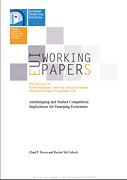Antidumping and Market Competition: Implications for Emerging Economies
10/11/2015 12:00

Antidumping and Market Competition: Implications for Emerging Economies by Chad P. Bown and Rachel McCulloch is published by European Unversity Institue, Robert Schuman Centre for Advanced Studies.
EUI Working Paper RSCAS 2015/76
Abstract
While the original justification of the antidumping laws in the industrial economies was to protect domestic consumers against predation by foreign suppliers, by the early 1990s the laws and their use had evolved so much that the opposite concern arose. Rather than attacking anti-competitive behavior, dumping complaints by domestic firms were being used to facilitate collusion among suppliers and enforce cartel arrangements. This paper examines the predation and anti-competitiveness issues from the perspective of the “new users” of antidumping—the major emerging economies for which antidumping is now a major tool in the trade policy arsenal. We examine these concerns in light of important ways in which the world economy and international trading system have been changing since the early 1990s, including more firms and more countries participating in international trade, but also more extensive links among suppliers and consumers through multinational firm activity and vertical specialization.
This text may be downloaded only for personal research purposes. Additional reproduction for other purposes, whether in hard copies or electronically, requires the consent of the author(s), editor(s). If cited or quoted, reference should be made to the full name of the author(s), editor(s), the title, the working paper, or other series, the year and the publisher.
Abstract
While the original justification of the antidumping laws in the industrial economies was to protect domestic consumers against predation by foreign suppliers, by the early 1990s the laws and their use had evolved so much that the opposite concern arose. Rather than attacking anti-competitive behavior, dumping complaints by domestic firms were being used to facilitate collusion among suppliers and enforce cartel arrangements. This paper examines the predation and anti-competitiveness issues from the perspective of the “new users” of antidumping—the major emerging economies for which antidumping is now a major tool in the trade policy arsenal. We examine these concerns in light of important ways in which the world economy and international trading system have been changing since the early 1990s, including more firms and more countries participating in international trade, but also more extensive links among suppliers and consumers through multinational firm activity and vertical specialization.
This text may be downloaded only for personal research purposes. Additional reproduction for other purposes, whether in hard copies or electronically, requires the consent of the author(s), editor(s). If cited or quoted, reference should be made to the full name of the author(s), editor(s), the title, the working paper, or other series, the year and the publisher.
| Tải tài liệu | |
|---|---|
| antidumping-and-market-competition | |
Các tin khác
- The Dispute Settlement Crisis in the World Trade Organization: Causes and Cures (16/03/2018)
- Modification of trade defence rules regarding non-market economy costs and prices (23/02/2018)
- Research Paper: Options for Disciplining the Use of Trade Remedies in Clean Energy Technologies (03/08/2017)
- Addressing the rise of Trade Remedies against Environmental Goods (03/08/2017)
- Anti-dumping Retaliation - —A Common Threat to International Trade (15/11/2016)
 Home
Home
 About Us
About Us




















